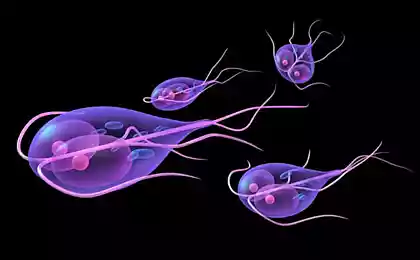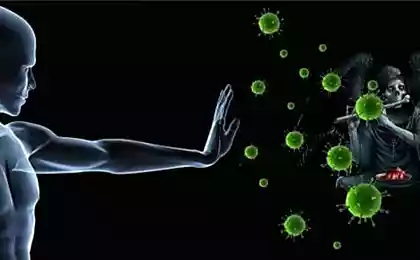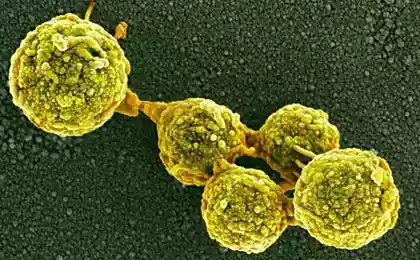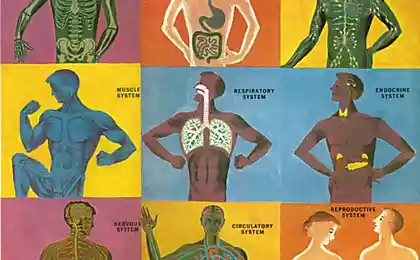296
10 Signs That You Have Parasites
The idea that a parasite lives in your body is frightening, but you are not alone; parasites are far more common than you think. The myth is that only the population of underdeveloped countries suffer from parasites.
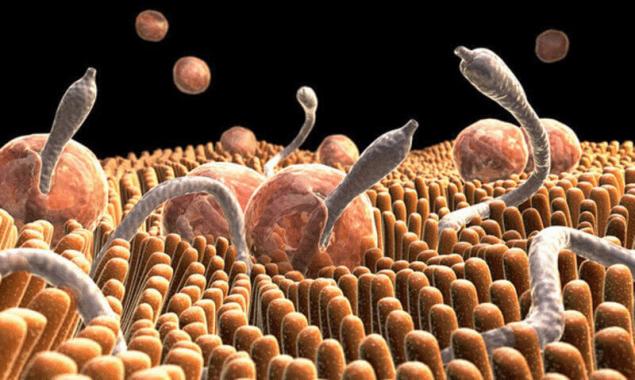
Most patients in the average clinic have parasites. From this article you will learn that the presence of parasites in the body manifests itself through a huge number of different symptoms, only a few of which are associated with digestion.
What is a parasite? A parasite is any organism that lives in another organism and feeds on it. Intestinal parasites are tiny organisms, usually worms, that feed on what you eat.
Examples of parasites are trichophythias, tapeworms, pinworms, trichocephalus, ankylostomatides and many others. Because parasites vary in many shapes and sizes, they can cause very different problems.
Some eat your food, leaving you hungry after each meal and preventing you from gaining weight. Others feed on the red blood cells of your blood, causing anemia. Some lay eggs that cause itching, irritability, and even insomnia. If you have tried a thousand ways to cure your bowels and tried unsuccessfully to get rid of the symptoms, the main cause of most of these unexplained and untreatable symptoms may be parasites.
10 Reasons Your Body May Have Parasites:
You suffer from constipation, diarrhea, gas, or other symptoms of irritable bowel syndrome.
You’ve traveled the world and remember that you’ve had travelers’ diarrhea overseas.
You have a history of food poisoning and your digestion has changed since then.
You find it difficult to sleep or you wake up many times during the night.
You have irritations on your skin, unexplained rashes, hives, pink acne or eczema.
You grind your teeth in your sleep.
You have pain or aching muscles or joints.
You feel overworked, you have depression or frequent bouts of apathy.
After eating, you never eat or feel satisfied.
You have been diagnosed with iron deficiency anemia.
Symptoms of parasites in the body can often seem incoherent and inexplicable. As noted earlier, there are many types of parasites to which the human body is exposed.
Most often, parasites in the body lead to constipation rather than diarrhea, however, some of them are able to change the fluid balance in your intestines, thereby causing diarrhea.
Sleep problems, skin irritations, mood changes and muscle pain can be caused by toxins that parasites release into the bloodstream. These toxins often become a cause of anxiety, which can manifest in many forms.
For example, you often wake up in the middle of the night or clasp your teeth in your sleep — all signs that your body is in a state of anxiety while you are resting.
When the aforementioned toxins interact with your neurotransmitters or blood cells, they can lead to mood changes or skin irritations.
How to check for parasitesThe best way to test for parasites is to take a stool test. Most doctors, in case of suspected parasites, will prescribe a standard analysis of feces, but such tests are not as accurate as those used in medicine functional disorders.
Standard tests of feces for eggs of worms and parasites
Standard stool tests can detect parasites or their eggs, but such tests are largely limited. The problem with these tests is that they are only conditionally effective. They require three separate stool samples, which are sent to a laboratory where the pathologist examines them under a microscope. The life cycle of parasites is unique – it allows them to be in an intermediate state between hibernation and functioning.
To detect parasites in standard tests, a stool sample must contain a live parasite, the parasite must remain alive while the sample is delivered to the laboratory, and then the pathologist must see the live parasite in a microscope.
While this type of test may be important to some, it does not detect dormant parasites, and for this reason, this type of test often gives an erroneous negative result.
Detailed analysis of feces, used in the medicine of functional disorders.
The detailed analysis is much more accurate than the standard stool analysis, due to the fact that it uses polymerase chain reaction (PRC) technology, which makes the parasite's DNA more noticeable. This means that the parasite may be dead or dormant, but it will still be detected during this analysis.
Since this analysis uses PRC technology, its success does not depend on the pathologist’s ability to see the parasite through a microscope. Quite frequent is the diagnosis of a parasite in a patient whose standard analysis of feces did not reveal a pest.
How to cure parasitesA detailed analysis of feces is able to identify 17 different parasites, so when the doctor finds out what kind of pest is in the patient's body, he prescribes those drugs that are aimed at destroying a certain type of parasite.
However, if the parasite cannot be detected, the doctor may prescribe a mixture of medicinal herbs to the patient, including magnesia with caprylic acid, barberine, extracts of anchora, wormwood of an annual, grapefruit, barberry, bear berry, and black walnut.
These ingredients can usually be found at the pharmacy. By forming beneficial gut bacteria, these herbal formulas provide a wide range of actions to combat the most common pathogens found in the human gastrointestinal tract.
Before starting the fight against parasites with the help of medicinal herbs, it is recommended to consult a doctor, and, in the case of previous liver diseases, excessive alcohol consumption, or a previously noted increase in the level of liver enzymes, it is worth checking their level again.
If you have suspicions about the presence of a parasite in your body, you should consult a doctor to prescribe a detailed analysis of feces. After all, all this begins in the intestine, and the intestine is the path to health. A healthy gut is a healthy person.
Photo: livelovefruit.com published
P.S. And remember, just changing our consumption – together we change the world!
Source: mixednews.ru/archives/43602

Most patients in the average clinic have parasites. From this article you will learn that the presence of parasites in the body manifests itself through a huge number of different symptoms, only a few of which are associated with digestion.
What is a parasite? A parasite is any organism that lives in another organism and feeds on it. Intestinal parasites are tiny organisms, usually worms, that feed on what you eat.
Examples of parasites are trichophythias, tapeworms, pinworms, trichocephalus, ankylostomatides and many others. Because parasites vary in many shapes and sizes, they can cause very different problems.
Some eat your food, leaving you hungry after each meal and preventing you from gaining weight. Others feed on the red blood cells of your blood, causing anemia. Some lay eggs that cause itching, irritability, and even insomnia. If you have tried a thousand ways to cure your bowels and tried unsuccessfully to get rid of the symptoms, the main cause of most of these unexplained and untreatable symptoms may be parasites.
10 Reasons Your Body May Have Parasites:
You suffer from constipation, diarrhea, gas, or other symptoms of irritable bowel syndrome.
You’ve traveled the world and remember that you’ve had travelers’ diarrhea overseas.
You have a history of food poisoning and your digestion has changed since then.
You find it difficult to sleep or you wake up many times during the night.
You have irritations on your skin, unexplained rashes, hives, pink acne or eczema.
You grind your teeth in your sleep.
You have pain or aching muscles or joints.
You feel overworked, you have depression or frequent bouts of apathy.
After eating, you never eat or feel satisfied.
You have been diagnosed with iron deficiency anemia.
Symptoms of parasites in the body can often seem incoherent and inexplicable. As noted earlier, there are many types of parasites to which the human body is exposed.
Most often, parasites in the body lead to constipation rather than diarrhea, however, some of them are able to change the fluid balance in your intestines, thereby causing diarrhea.
Sleep problems, skin irritations, mood changes and muscle pain can be caused by toxins that parasites release into the bloodstream. These toxins often become a cause of anxiety, which can manifest in many forms.
For example, you often wake up in the middle of the night or clasp your teeth in your sleep — all signs that your body is in a state of anxiety while you are resting.
When the aforementioned toxins interact with your neurotransmitters or blood cells, they can lead to mood changes or skin irritations.
How to check for parasitesThe best way to test for parasites is to take a stool test. Most doctors, in case of suspected parasites, will prescribe a standard analysis of feces, but such tests are not as accurate as those used in medicine functional disorders.
Standard tests of feces for eggs of worms and parasites
Standard stool tests can detect parasites or their eggs, but such tests are largely limited. The problem with these tests is that they are only conditionally effective. They require three separate stool samples, which are sent to a laboratory where the pathologist examines them under a microscope. The life cycle of parasites is unique – it allows them to be in an intermediate state between hibernation and functioning.
To detect parasites in standard tests, a stool sample must contain a live parasite, the parasite must remain alive while the sample is delivered to the laboratory, and then the pathologist must see the live parasite in a microscope.
While this type of test may be important to some, it does not detect dormant parasites, and for this reason, this type of test often gives an erroneous negative result.
Detailed analysis of feces, used in the medicine of functional disorders.
The detailed analysis is much more accurate than the standard stool analysis, due to the fact that it uses polymerase chain reaction (PRC) technology, which makes the parasite's DNA more noticeable. This means that the parasite may be dead or dormant, but it will still be detected during this analysis.
Since this analysis uses PRC technology, its success does not depend on the pathologist’s ability to see the parasite through a microscope. Quite frequent is the diagnosis of a parasite in a patient whose standard analysis of feces did not reveal a pest.
How to cure parasitesA detailed analysis of feces is able to identify 17 different parasites, so when the doctor finds out what kind of pest is in the patient's body, he prescribes those drugs that are aimed at destroying a certain type of parasite.
However, if the parasite cannot be detected, the doctor may prescribe a mixture of medicinal herbs to the patient, including magnesia with caprylic acid, barberine, extracts of anchora, wormwood of an annual, grapefruit, barberry, bear berry, and black walnut.
These ingredients can usually be found at the pharmacy. By forming beneficial gut bacteria, these herbal formulas provide a wide range of actions to combat the most common pathogens found in the human gastrointestinal tract.
Before starting the fight against parasites with the help of medicinal herbs, it is recommended to consult a doctor, and, in the case of previous liver diseases, excessive alcohol consumption, or a previously noted increase in the level of liver enzymes, it is worth checking their level again.
If you have suspicions about the presence of a parasite in your body, you should consult a doctor to prescribe a detailed analysis of feces. After all, all this begins in the intestine, and the intestine is the path to health. A healthy gut is a healthy person.
Photo: livelovefruit.com published
P.S. And remember, just changing our consumption – together we change the world!
Source: mixednews.ru/archives/43602

